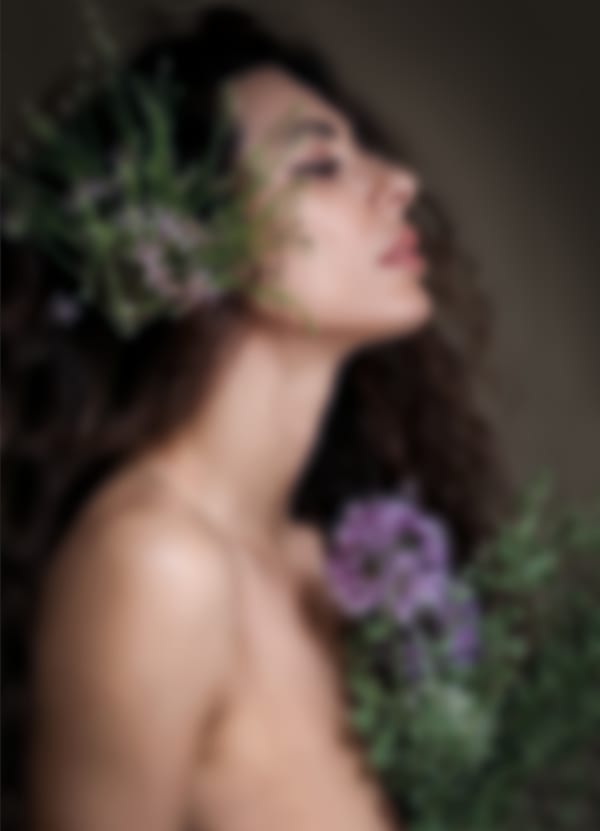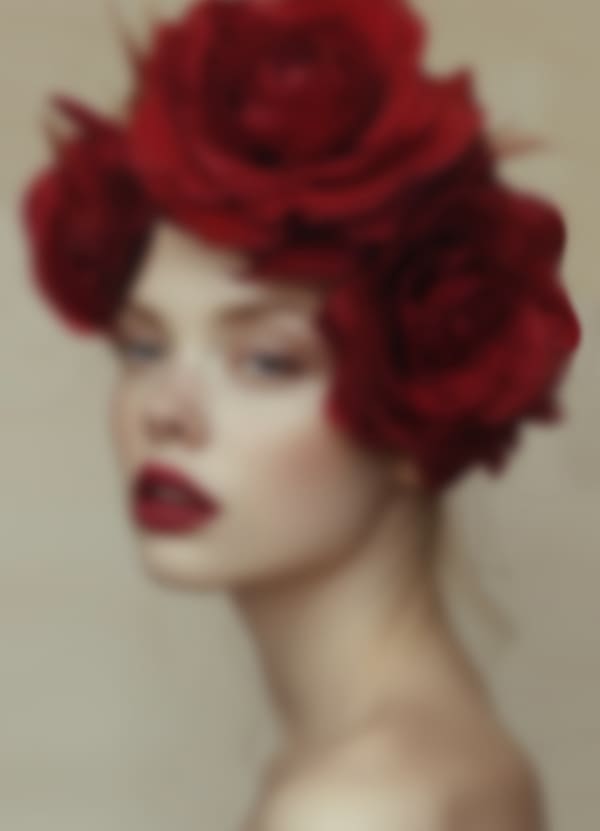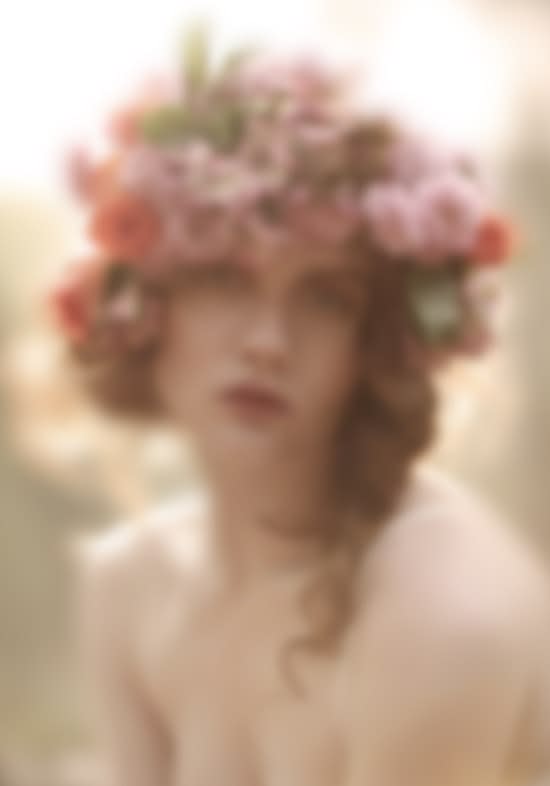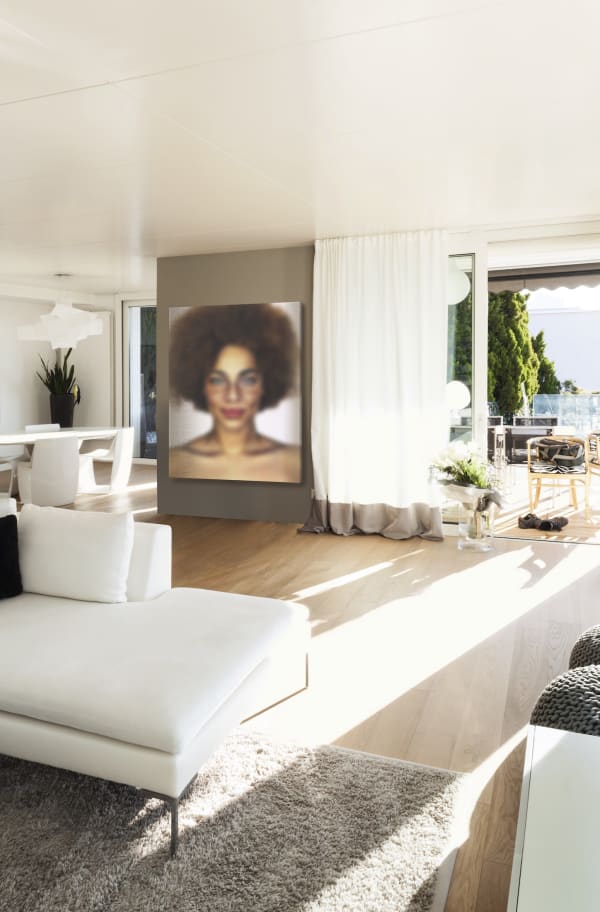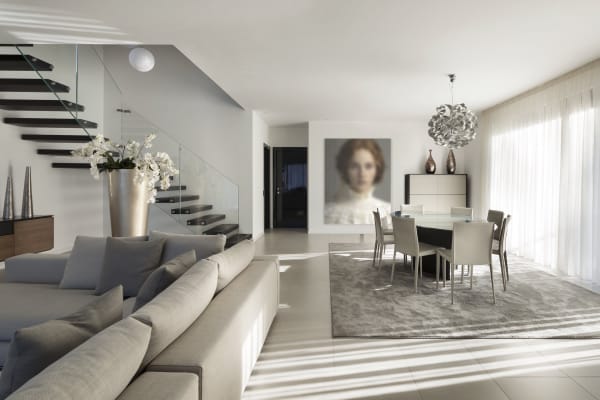A WOMAN IS LIKE A FLOWER: SOFT, MYSTERIOUS, AND INFINITELY POWERFUL IN HER SILENT BLOOMING
Unknown
With the Eden collection, Chiara Del Vecchio explores the profound connection between the female figure and the floral world, embarking on a visual journey through beauty, identity, and memory. Her works bring to life an inner garden—suspended between dream and symbol—where the woman appears as an archetypal being: both fragile and powerful.
The flower, a recurring presence in her paintings, is not a mere decorative element but a living metaphor: a symbol of fleeting and overwhelming beauty, of an intensity that reveals itself in the moment and leaves a lasting trace. Del Vecchio’s signature use of the airbrush creates soft, dreamlike surfaces, where figures emerge like apparitions, suspended between the visible and the invisible.
In Eden, the women do not speak—they preserve. They do not impose—they inhabit. They are poetic presences, hybrid beings in which body and nature merge into a single, silent blooming.
Eden is an invitation to contemplate beauty as a state of being—an act of reconnection with what is authentic, intimate, and profound. A visual lexicon that speaks to the soul and leads us into the mysterious heart of the sublime.
-
 EDN01 - Adelaide, 2025
EDN01 - Adelaide, 2025 -
 EDN02 - Adelaide, 2025
EDN02 - Adelaide, 2025 -
 EDN03 - Angelica, 2025
EDN03 - Angelica, 2025 -
 EDN04 - Angelica , 2025
EDN04 - Angelica , 2025 -
 EDN05 - Josephine, 2025
EDN05 - Josephine, 2025 -
 EDN06 - Beatrice, 2025
EDN06 - Beatrice, 2025 -
 EDN07 - Genevieve, 2025
EDN07 - Genevieve, 2025 -
 EDN08 - Charlotte, 2025
EDN08 - Charlotte, 2025 -
 EDN10 - Jun, 2025
EDN10 - Jun, 2025 -
 EDN13 - Raffaella, 2025
EDN13 - Raffaella, 2025 -
 EDN14 - Raffaella, 2025
EDN14 - Raffaella, 2025 -
 EDN16 - Ophelia, 2025
EDN16 - Ophelia, 2025 -
 EDN17 - Juliette, 2025
EDN17 - Juliette, 2025 -
 EDN18 - Seraphina, 2025
EDN18 - Seraphina, 2025 -
 EDN19 - Ada, 2024
EDN19 - Ada, 2024 -
 EDN20 - Ada, 2024
EDN20 - Ada, 2024 -
 EDN21 - Ada, 2024
EDN21 - Ada, 2024 -
 EDN22 - Dafne, 2023
EDN22 - Dafne, 2023 -
 EDN23 - Dafne, 2023
EDN23 - Dafne, 2023
In the series of works entitled Eden, Chiara Del Vecchio embarks on a visual and symbolic investigation centered on the female figure and her profound connection with the floral imaginary. The collection unfolds as an aesthetic and conceptual journey, inviting the viewer to traverse an inner garden rich in emotional, cultural, and symbolic stratifications. Yet this is not a paradisiacal Eden in the canonical sense, but rather a suspended dimension in which beauty reveals itself in its most vulnerable—and precisely for this reason—its most intense and radiant form.
The reference to the Garden of Eden is not merely topographical or theological: it is, rather, the projection of an original state, a mental and archetypal space where identity comes face to face with its own primordial nature. In this context, the woman becomes at once creature and creator, real body and symbol, presence and myth. She is the guardian of a tacit knowledge, inscribed in petals and gestures, in a beauty that does not offer itself as mere ornament, but as a totalizing experience of being.
The flower—a recurring and central subject—rises as a complex and multilayered metaphor: an emblem of a beauty that is not measured by its duration, but by its ability to embody a fleeting instant of absolute truth. In Del Vecchio’s poetics, the flower’s ephemeral nature is not a sign of loss, but the manifestation of an unrepeatable intensity, a spark that briefly illuminates time before dissolving, leaving behind a trace. The flower is never a simple decorative element, but a living, pulsing entity that accompanies—and at times envelops—the female figure, suggesting a profound interdependence between identity and nature, between the visible and the invisible, between time and form.
Supporting this visual narrative is a distinctive painting technique centered on the use of the airbrush, a tool that, through the atomization of color, enables the creation of soft, blurred surfaces that oscillate between figuration and dissolution. The out-of-focus effect, masterfully achieved with the airbrush, is not a stylistic flourish, but a conceptual choice: the boundary between reality and imagination becomes porous, contours fade, and figures emerge like floating visions in memory. This treatment of the image amplifies the sensation of impermanence, but also of intimacy; it suggests that true beauty does not impose itself, but allows itself to be glimpsed, brushed, intuited.
Each figure portrayed in Eden stands as a silent yet powerful icon, capable of evoking the complexity of the feminine experience without ever resorting to explicit rhetoric. Del Vecchio’s women do not speak; they preserve. They do not impose; they inhabit space with a presence that is both delicate and radical. Their identity is constructed through the merging of body and bloom, of skin and petal, of form and fading.
Ultimately, Eden is a poetic and visionary meditation on beauty as a form of presence, on identity as a slow and conscious blooming, and on woman as a living archetype of a fragile yet fertile balance between the visible and the invisible. A symbolic garden where each work is a threshold, each face a passage, each flower an opportunity for revelation.
With this collection, Chiara Del Vecchio offers us a visual lexicon that speaks to the unconscious, that stirs emotion while simultaneously challenging the gaze. An invitation to lose and rediscover oneself in the fertile mystery of beauty—where the ephemeral is not a limit, but the very essence of the sublime.











